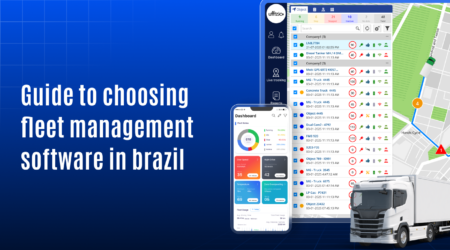The role of vehicle inspection software in preventive fleet maintenance

Unplanned breakdowns cost fleets more than just money. They disrupt schedules, lower driver productivity, and compromise road safety. A recent industry study revealed that over 50 percent of major vehicle failures could have been prevented with timely inspections and maintenance. As fleet sizes grow and compliance norms tighten, manual inspection processes often fall short of providing the visibility and accuracy required.
This is where vehicle inspection software comes in. Instead of relying on paper checklists or sporadic manual audits, modern fleets now use digital inspection tools to capture real-time, trackable data for each vehicle. With features like customizable checklists, image uploads, and instant fault detection, inspection software transforms routine checks into actionable maintenance triggers.
Whether you are managing a commercial delivery fleet or integrating services for multiple clients, vehicle inspection software helps build a proactive maintenance culture. It ensures that minor issues do not snowball into major repairs. In this blog, we will explore how this software plays a central role in preventive fleet maintenance and why it is becoming an operational essential.
What is Vehicle Inspection Software?
Vehicle inspection software is a digital solution designed to streamline and automate the vehicle inspection process. It replaces traditional paper-based checklists with smart, customizable digital forms that drivers and technicians can access through mobile or web applications. These forms cover various inspection categories such as tires, brakes, lights, engine components, fluids, and overall vehicle condition.
The software enables real-time reporting of vehicle health by allowing users to mark defects, upload images, and submit inspection reports instantly. Fleet managers receive immediate updates, making it easier to prioritize repairs and schedule maintenance before issues escalate.
More than just a checklist tool, vehicle inspection software acts as an essential part of the preventive maintenance ecosystem. It ensures that inspections are consistent, verifiable, and well-documented. With all data stored digitally, it also helps fleets maintain historical records for audits, compliance checks, and long-term asset management.
Why Preventive Maintenance Matters in Fleet Operations
- Reduces breakdowns
Regular checks help catch problems early before they cause sudden vehicle failure.
- Minimizes repair costs
Fixing small issues on time prevents expensive emergency repairs later.
- Improves vehicle lifespan
Well-maintained vehicles last longer and perform more reliably on the road.
- Boosts fleet availability
Fewer breakdowns mean more vehicles stay on the road and complete scheduled jobs.
- Supports better planning
Scheduled maintenance avoids last-minute disruptions and helps in smooth operations.
- Ensures safety and compliance
Timely servicing helps meet safety standards and avoid penalties during audits.
How Vehicle Inspection Software Enables Preventive Maintenance
- Captures real-time faults
Drivers and technicians can instantly report issues during inspections using mobile devices.
- Creates automated service schedules
Inspection results can trigger reminders for maintenance tasks based on actual vehicle condition.
- Tracks inspection history
Every inspection is recorded, helping managers spot recurring issues and make informed decisions.
- Improves communication
Inspection reports are shared instantly with the maintenance team, reducing delays in action.
- Simplifies documentation
All records are stored digitally, making audits and compliance checks easier.
- Encourages daily checks
With easy-to-use digital forms, drivers are more likely to complete daily inspections regularly.
Key Features of Vehicle Inspection Software
Benefits for Fleet Managers and System Integrators
- Centralized vehicle health insights
View inspection reports, fault trends, and maintenance needs across the entire fleet in one dashboard.
- Clear driver performance tracking
Identify inspection gaps or missed checks to promote consistent habits among drivers.
- Effortless record management for audits
Instantly access past inspections for compliance checks without chasing paper trails.
- Flexible client handling for integrators
Manage inspections for multiple fleets or clients from a single platform.
- Informed maintenance planning
Use inspection trends to plan parts inventory, workshop schedules, and maintenance budgets more accurately.
Conclusion
The success of any fleet depends on how well its vehicles are maintained and how early potential issues are identified. With vehicle inspection software, routine checks become more reliable, data driven, and easy to manage. It helps teams move faster from spotting a problem to resolving it without losing time on paperwork or miscommunication.
For growing fleets and system integrators, this tool brings structure to daily operations while supporting long term maintenance goals. As vehicles get more complex and uptime becomes more valuable, having a digital inspection system in place is a smart and practical move.




